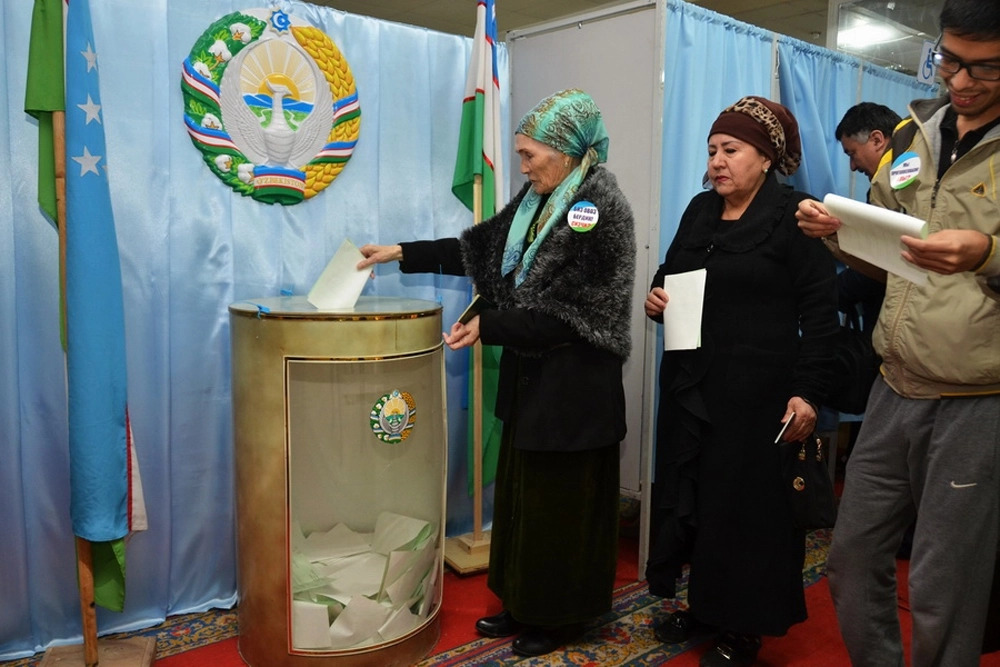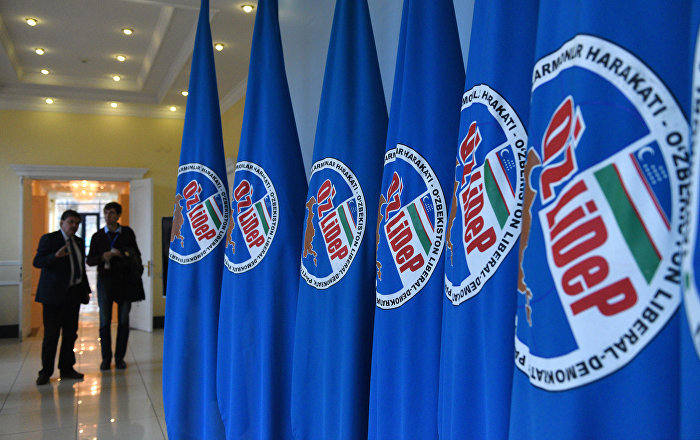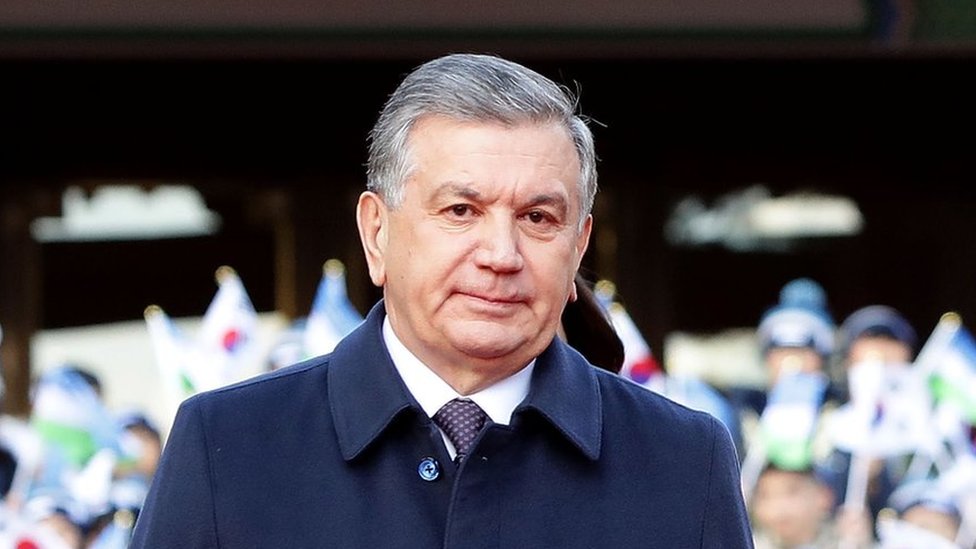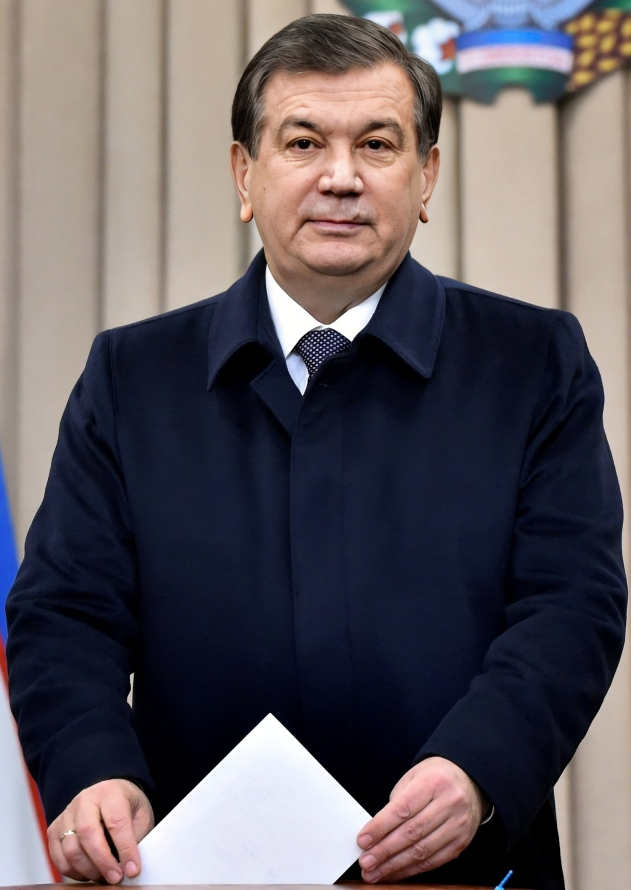Presidential Election was held on December 4, 2016 in Uzbekistan; according to Uzbekistan’s Central Election Commission acting President and Prime Minister Shavkat Mirziyoyev won the election with 88.6 percent of the vote which is 1.51 percent more than what late Islam Karimov got when he was first elected president in 1991.
Uzbek Central Election Commission
According to Chairman Uzbek Central Election Commission Mirza-Ulugbek Abdusalomov no violations were observed at polling stations during the election. The official turnout was 87.83 percent, with more than 17.9 million out of some 20 million eligible voters taking part in the election.
Uzbek True Democratic Spirits
The election showed true democratic spirits of Uzbekistan political parties, its people and Central Election Commission which monitored and independently conducted the election. Once again the people emerged victorious and their votes were documented and respected. Uzbek Model of Democracy once again showed its strength, stability and sustainability where people voted for their leaders.
9,339 polling stations in the Republic of Karakalpakstan regions and Tashkent city, as well as 44 abroad facilitated voting through Uzbekistan. They provided conditions for the electorate to manifest their free will. 37,500 observers from political parties also monitored the election.
Among the presidential candidates were the country’s Acting President Shavkat Mirziyoyev from UzLiDeP, Sarvar Otamuratov from Milly Tiklanish Party, Nariman Umarov from Adolat Party and Hotamzhon Ketmonov from PDPU. The new head of state will be elected for a period of five years as per Uzbek Constitution. During election campaign Mirziyoyev mostly focused on economic issues: private enterprises and foreign investment, pledging to double Uzbekistan’s GDP by 2030.
Immaculate Preparations
According to Uzbekistan Central Election Commission nearly 80,000 observers monitored the presidential election including over 500 international representatives from 43 countries and international organizations like the OSCE ODIHR, CIS Executive Committee, Shanghai Cooperation Organization and Organization of Islamic Cooperation. Presence of more than 500 international election observers and active participation of reputed organizations were proof that Uzbekistan Presidential election achieved highest international standards of transparency, fairness and freeness. Over a thousand news items, articles and analysis about the elections in Uzbekistan have been published and aired in the foreign media since the start of the election campaign which shows value of its democratic system, political maturity, independence of state organs, vibrancy of NGOs and mass media.
Presidential Election 2016: A Multi-Parties Contest
Mirziyoyev, 59, contested against three other candidates nominated by other political parties. He was formally nominated for president by the Liberal Democratic Party, the largest political party in Uzbekistan. Khotamjon Ketmonov of the People’s Democratic Party and Nariman Umarov of the Adolat Party also ran against Karimov in the March 2015 presidential election. Mirziyoyev, who has been prime minister since 2003, has said that he intends to largely follow the political course of Karimov.

Uzbekistan Model of Democracy
Uzbekistan Model of Democracy has once again become victorious where elections, voters and people are the real decision makers. Votes are casted, documented and counted and have paved way of a smooth transition from one government to another. It is indeed height of Uzbekistan Model of Democracy where all democratic spirits are enacted and maintained. It was not whitewashing as reported in the mainstream mass media of Europe, it was reflection of Uzbekistan’s people free will, political maturity and highest levels of fair, free and transparency at every stage of the said election.
Baseless Observations
The OSCE’s Office of Democratic Institutions and Human Rights noted in its latest assessment that the election “underscored the need for comprehensive reforms to address long-standing procedural and systematic shortcomings”. On the contrary, not a single violation of rule, procedure or methodology was reported during the election as more than 800 international election observers were there to observe the presidential election 2016.
The report further objected:-
The dominant position of state actors and limits on fundamental freedoms undermine political pluralism and led to a campaign devoid of genuine competition … Media covered the election in a highly restrictive and controlled environment, and the state-defined narrative did not provide voters the opportunity to hear alternative viewpoints, the observers said.
It is a totally baseless observation as every Uzbek political party was free to participate in the election with rigorous political campaigns, manifesto, meetings, and media coverage through mass media and even out door advertisings. Every country has its own unique political culture, local traditions and spirits of competition which must not be compared on the so-called western criteria of political canvassing and electioneering and of course Uzbekistan has its own well established democratic political system which cares about free will of its people. The Presidential election was held in the spirit of openness and transparency of the highest level.
Uzbekistan Central Election Commission: An independent Statutory Status
Uzbekistan Central Election Commission has independent statutory status and every election is carried/ conducted by it. It maintains complete transparency in all the elections in the country which are conducted on the principles of equal opportunity, free will, free and fair manner. Every election has a large number of international foreign observers who act independently during elections and always confirm its validity, transparency, free and fair facilitation of the government, free will of the people, equal right of participation and access by using means of mass media (print & electronic).
Uzbek Political Parties Freedom enacted
Being an independent organ of the Uzbek State, Central Election Commission permitted all political parties and their presidential candidates to conduct their political campaigns through mass media, with publication and distribution of print, visual, audiovisual and other campaign materials and the last but not the least, meetings with voters.
Moreover, websites of political parties, print editions of the parties, outdoor advertising, electronic monitors, electoral leaflets and other campaigning materials had also been allowed them to convince their supporters. Furthermore implementing of “Equal Right of Access” as granted by its Constitution, the National Broadcasting Company’s TV and radio channels O’zbekiston and Yoshlar provided each presidential nominee with 638 free airtime minutes, while 12 local TV and radio channels of the same Company provided each candidate with 206 free minutes, ‘Toshkent’ TV and radio channel granted 286 minutes of airtime. Khalq Suzi, Narodnoe Slovo and Pravda Vostoka newspapers allocated 6 pages of print space, while 30 local newspapers had assigned 55 pages.
Uzbek Constitution: Guarantor of Political Freedom and Basic Human Rights
For further strengthening of democratic spirit as granted by its Constitution and implemented by Central Election Commission, the candidates were also provided with free print space in Ovozi Tojik and Ovozi Samarkand newspapers, published in Tajik, as well as in the Nurly Zhol newspaper in Kazakh language. It increased all the candidates’ connectivity with the local population and different segments/factions of the society.
Provision of Outdoor Advertising
Moreover, each candidate was granted 642 outdoor advertising means in the regions. 36 electronic monitors across the nation broadcast campaigning videos of presidential nominees for free, showing them in a single block. Free, fair and equal access to mass media (print, electronic) and outdoor means to all the candidates upheld true spirits of accountability, impartiality and political openness of Uzbekistan political parties and civil society.

Multi-Parties Presidential Election 2016
As prevalent in western democracies Presidential election of Uzbekistan was also contested on certain policies and issues. UzLiDeP relied on entrepreneurs, emerging middle class, business elite, including that in the agricultural sector. The People’s Democratic Party of Uzbekistan capitalized massive social reforms. Adolat SDPU showcased modern social democracy, with industrial workers and wage-workers of the services sector as its main constituency. Milly Tiklanish DPU projected creative and scientific intellectuals. It considered it important to comprehensively support domestic producers, uphold handicrafts and family businesses, as well as tourism as an effective economic instrument for promoting the national culture and history.
Bounties of Uzbekistan Model of Democracy
Since its independence the Uzbekistan Model of Democracy has delivered good things for its people. In Uzbekistan democracy stands for service, people friendly policies, optimal utility of sources and resources, accountability, pro-business and investment policies and rule of the law.
Uzbek democracy stands for immense social development where people are always preferred to corporate profits. It stands for deliverance of good governance which has been used for reduction of poverty (among the lowest in the region), building of social networks (largest in the CIS), Small and Medium Enterprises (SMEs) among the highest in the region, empowerment of women (highest in the CIS) and sense of real ownership through micro-financing through innovating methods. Uzbekistan is now an icon of market liberalization, good governance, and transparency. Due to all this Uzbekistan has succeeded to mitigate negative spillovers of regional weak economic conditions as well as global economic and financial crises. Its highest GDP percentage in the last two decades is the bounty of its strong, stable and sustained democracy. The election of Shavkat Mirziyoyev as president for the next five years is victory of its democratic system.
Uzbekistan Model of Democracy & Political Maturity
Uzbekistan Model of Democracy has developed political maturity and encouraged pluralism in the country. It has achieved political maturity and pluralism by implementing different pro-democracy laws, decrees and acts on different times since 1991. It has never been prey of any political chaos, constitutional deadlock, social unrest or economic recession during its 25 years.
The formation of a multi-party model of democracy has been further strengthened after Presidential elections 2016. Grass-root institutionalization of democracy through regular elections and political parties are the backbone of its political maturity. Its capacity building traditions/measures and participatory community development is the real essence of its democracy where social development is even prioritized over economic growth.
Beauty of Uzbek Model of Democracy
The beauty of Uzbek Model of Democracy rests on continuation of elections. Article 117 of the Basic Law specifies that elections are conducted on the basis of universal, equal and direct suffrage by secret ballot. The right to vote is granted to the citizens of Uzbekistan who have reached the age of eighteen on the day of the election and older. The universal suffrage is implemented regardless of gender, race, ethnicity, language, religion, social origin, beliefs, individual or social status. Active participation of all the eligible voters, especially young people showed that Uzbekistan’s model of democracy is genuine, productive, participatory and pro-development.
Since independence many acts and laws have been adopted to directly regulate the electoral processes, including the law ‘On guarantees of electoral rights of citizens’, ‘On the elections of President of the Republic of Uzbekistan’, ‘On elections to the Oliy Majlis of the Republic of Uzbekistan’, ‘On the Central Election Commission’, and others. Certain aspects of the organization and conduct of elections are also regulated by specific regulations and instructions of the Central Election Commission. It is now obvious that Uzbekistan has formed a full code of laws on elections, which clearly upholds rule of law and rule of majority.
The Concept of Intensification of Democratic Reforms and Formation of Civil Society in Uzbekistan, as adopted by the national parliament in November 2010, is seen as an important policy document, also with regard to the further streamlining of the electoral legislation.
Moreover, certain articles of the Constitution of the Republic of Uzbekistan were amended within the framework of the Concept in 2014. It defined a system of democratic formation of the Central Election Commission as a permanent constitutional body, the basic principles of its activity strengthened the legal guarantees of independence of the entire system of the electoral bodies that are responsible for the organization of the elections to representative bodies, and established liability for interference with their activities. It was a giant leap in the arena of political system in the country.

Shavkat Mirziyoyev’s Convincing Victory
Shavkat Mirziyoyev’s convincing victory reflects his popularity and people’s confidence in his policies and broad recognition of his services for further strengthening of socio-economic development.
The United State congratulated acting President and Prime Minister Shavkat Mirziyoyev. “As Uzbekistan transitions into this new chapter, we look forward to sustained regional stability and progress towards broad economic, political and social reforms.” It also praised the election’s increased transparency and unfettered access to 600 international observers.
The Kremlin Press Service said in a statement that Russian President Vladmir Putin during a phone conversation congratulated Mirziyoyev on his impressive victory and wished him success.
Concluding Remarks
Shavkat Mirziyoyev won the Presidential Election 2016 with clear majority alongwith popular votes of 88.6 percent for the next five years. Uzbekistan’s Model of Democracy has once again reconfirmed its validity, relevancy and importance in the region and the world. Transition of power from the interim government to the new government has been completed with the declaration of the new president. The transition has been smooth because of strong democratic tradition which banks on free, fair and transparent elections, free will of its people, and continuation of political system.
Uzbek Political Manifestation is the best in the region where people elect their leaders through votes which decide the victor in elections. The role of independent Uzbekistan Election Commission is commendable for taking all possible measures to hold a free, fair and transparent election. The presence of more than 500 international election observers clearly shows that the Uzbekistan Model of Democracy is not closed but opened, interactive and transparent in all respects and meets all international standards.
The role of the independent mass media (print & electronic) was also commendable which followed true sense of democracy i.e. equal right of access, accountability and right of information. The Presidential Election achieved the highest international standards of impartiality, fairness and transparency and reflected true spirits of democratic Uzbekistan where people elect their leaders. Democracy once again is the victor and the people are the real instruments to elect their representatives.




